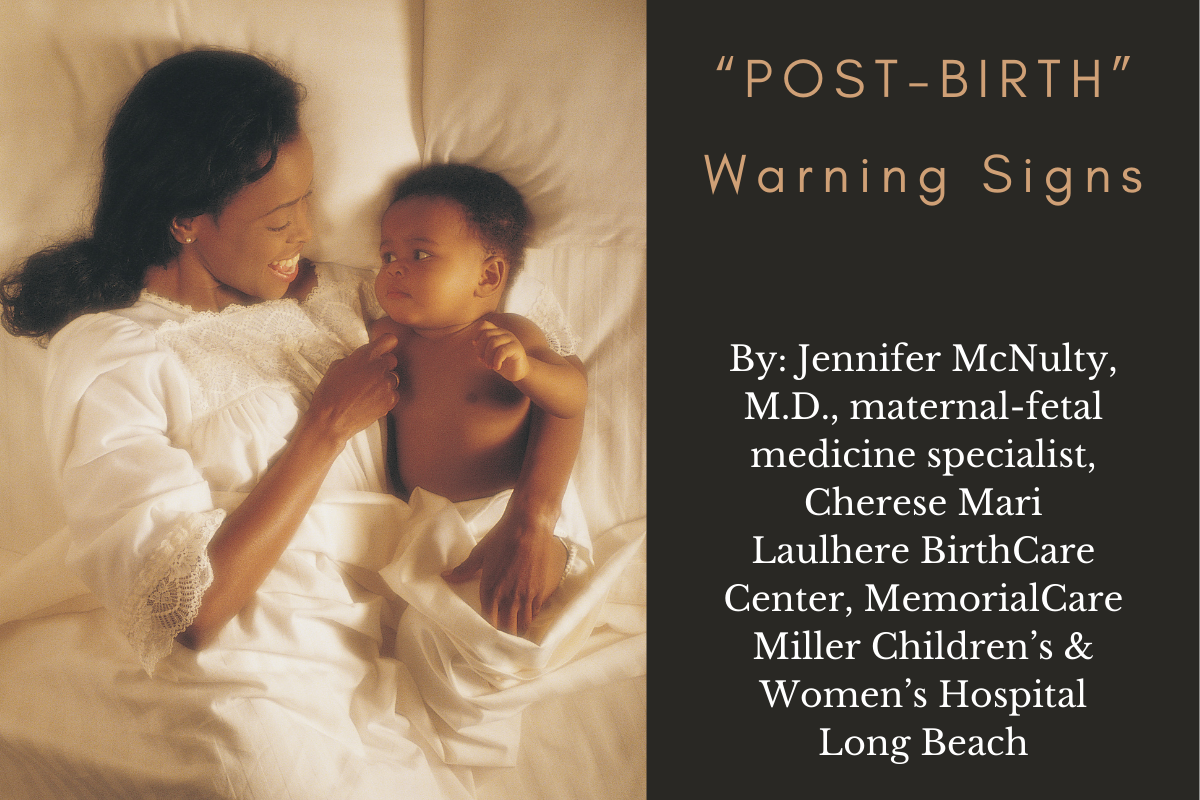“POST-BIRTH” Warning Signs
“POST-BIRTH” Warning Signs
By: Jennifer McNulty, M.D., maternal-fetal medicine specialist, Cherese Mari Laulhere BirthCare Center, MemorialCare Miller Children’s & Women’s Hospital Long Beach
Congratulations, you’re home with your brand-new baby! You remember everything from your baby care class, and have all your parenting books handy for any issue that may arise with your baby. But, what about you? Do you know that some women can have complications after giving birth? While most women experience a healthy recovery, it’s still important to learn the signs of the issues that can become life-threatening if you don’t receive immediate medical care.
The easiest way to remember the warning signs is using the acronym, POST-BIRTH. The first four letters (POST) signify signs to call 911 immediately. If you’re experiencing signs from the second set of letters (BIRTH), you can call your health care provider for advice. If your health care provider is unavailable, it is recommended to call 911 or to go to an emergency room.
POST
- Pain in the chest and Obstructed breathing: Pain in your chest, obstructed breathing or shortness of breath could mean there is a blood clot in your lung or you may have a heart problem.
- Seizures: If you’re experiencing seizures after you’ve given birth, it may mean you have eclampsia – a serious condition where high blood pressure results in seizures.
- Thoughts of hurting yourself or someone else: Feelings like this may be a sign of postpartum depression.
BIRTH
- Bleeding (heavy): After giving birth, you will experience some bloody vaginal discharge that may include some small blood clots. If you are soaking more than one pad in an hour or having blood clots the size of an egg or larger, you could have an obstetric hemorrhage.
- Incision: If you have an incision, whether from an episiotomy or Cesarean-section, that isn’t healing or has increased redness or any pus, you may have an infection.
- Red or swollen leg: If your leg is red, swollen, or painful or warm to the touch, it could be a sign of a blood clot.
- Temperature: A temperature of 100.4oF or higher, bad smelling vaginal blood or discharge, could be additional signs of an infection.
- Headache: If you experience a very painful headache or persistent less severe headaches, vision changes, or pain in the upper right area of your stomach, you may have high blood pressure (post-birth pre-eclampsia).
The Cherese Mari Laulhere BirthCare Center at MemorialCare Miller Children’s & Women’s Hospital Long Beach – a level IV maternity center – is equipped to handle issues that may arise during and after pregnancy, including any delivery complications. If a delivery requires special circumstances, maternal-fetal medicine specialists can intervene to ensure the health of mother and baby.
If a newborn is born prematurely, neonatologists, who are on-site 24/7, step in to provide care. The Neonatal Intensive Care Unit (NICU) has a level IV designation from the American Academy of Pediatrics, which means that it has advanced care capabilities to care for the sickest babies.
With comprehensive, expert services under one roof, the team at Miller Children’s & Women’s offers specialized care tailored to the needs of each family.
Learn more at millerchildrens.org/Firsts.





